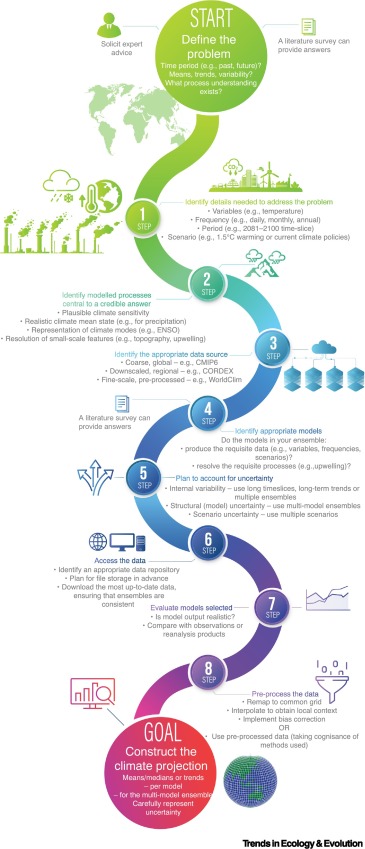Elsevier, The Lancet Regional Health - Europe, Volume 32, September 2023
Climate change is one of several drivers of recurrent outbreaks and geographical range expansion of infectious diseases in Europe. We propose a framework for the co-production of policy-relevant indicators and decision-support tools that track past, present, and future climate-induced disease risks across hazard, exposure, and vulnerability domains at the animal, human, and environmental interface.
Elsevier,
Trends in Ecology and Evolution, Volume 38, September 2023
To plan for an uncertain future, life scientists are often required to use the output from climate models to develop recommendations for policy. The authors explain best practice for use of these models, this research supports SDG 2, 13, 14 and 15.
Elsevier,
One Earth, Volume 6, 15 September 2023
This article advances SDG # 13 by arguing that flaws with carbon offsets, such as exaggerated climate benefits, emission avoidance rather than carbon removal, non-durable carbon storage, greenwashing, and double-counting, ultimately make the current system incompatible with the Paris Agreement.
Elsevier,
Journal of Climate Change and Health, Volume 13, 1 September 2023
This article advances SDG # 3, 4, 8, 10 and 13 by compiling evidence showing that climate change and its various consequences can adversely affect brain development in the fetal through the early childhood stages. Long-term consequences on health, education and economies are significant. T
Elsevier,
Cell Reports Physical Science, Volume 4, 20 September 2023
Climate change is driving the need for cool spaces, which currently relies largely on mechanical air conditioning that consumes power and contributes to emissions. This article examines how to create a passive cooling system with good ventilation using no mechanical equipment, achieving sub-ambient temperature cooling that could be extended to larger homes and structures. As such, it supports SDGs 3 (ensuring access to cool livable spaces), SDG 9 (more sustainable infrastructure to cool homes), and SDG 13 (reducing the need for traditional air conditioning).
Elsevier,
eClinicalMedicine, Volume 63, September 2023
This Article supports SDG 3 by showing that, among suicide decedents in NSW, Australia, most had little contact with healthcare in the year before death, suggesting that suicide prevention measures could be introduced in non-healthcare settings such as schools, universities, and workplaces. The authors also note that suicide prevention strategies should also target people with worsening physical health conditions, especially those prescribed opioids, and people with serious mental health conditions who have missed appointments or reduced appointment frequency with mental health professionals.
Elsevier,
Transportation Research Interdisciplinary Perspectives, Volume 21, September 2023
How people commute to work can have a significant effect on their mental health. This article shows that private car is worse than public or active transport in this respect. Policy measures can encourage people to use modes of transport that promote better mental health.


